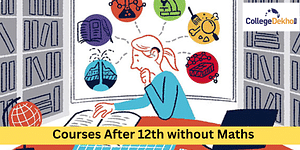BSc Home Science Syllabus & Subjects 2025
The BSc Home Science Syllabus consists of subjects such as Home Management, Resource Management, Economics, Fashion, Child Psychology, Human Nutrition, Food Science, etc. Check out the core subjects under the BSc Home Science Syllabus and its detailed course structure on this page.
BSc Home Science Syllabus and Subject Overview
The BSc Home Science subjects and syllabus are taught over a span of 3 years. The course structure is designed in such a way that the entire syllabus of BSc Home Science is taught in six semesters. Subjects covered under the syllabus of a bachelor’s degree in Home Science include Home Management, Resource Management, Economics, Fashion, and Child Psychology, Human Nutrition, Food Science, etc. The course structure covers important topics that are related to Physical Sciences, Life Sciences, Social Change, Communication Systems, and Nutrition.
The BSc Home Science course combines Physics, Chemistry, Biology, Physiology, Hygiene, Sociology, Home Management, and Food and Nutrition. The course also includes skill-based training in areas like fashion, culinary arts, nutrition, and interior design. BSc Home Science syllabus includes a mixture of core and elective subjects that provide students with both theoretical and practical knowledge so that they can excel in their field. Students interested in pursuing the BSc Home Science course must be enthusiastic about the programme because it requires a significant amount of practical effort and commitment.
Mainly, the syllabus for a Bachelor of Science (BSc) Home Science programme can vary from college to college, but core subjects usually include:
- Human development
- Food and nutrition
- Physiology
- Resource management
- Fabric/apparel science
- Sustainable development
- Communication
Nowadays, there is a high demand for courses in Home Sciences due to the growth in employment prospects in this industry. Industries such as healthcare, fashion design, education, dietetics and nutrition, etc, often have a high demand for Home Science students. To read about the BSc Home Science syllabus semester-wise in detail, scroll through this page.
Related Link: Top BSc Home Science Colleges in India 2025
Table of Contents
- BSc Home Science Syllabus and Subject Overview
- Quick Facts About BSc Home Science
- BSc Home Science Syllabus Semester-Wise
- BSc Home Science Subjects
- BSc Home Science Entrance Exam Syllabus
- BSc Home Science Important Books
- BSc Home Science Course Structure
- Top BSc Home Science Colleges in India
- FAQs about BSc Home Science Syllabus
Quick Facts About BSc Home Science
Following are some quick facts about BSc Home Science:
- BSc Home Science is an exciting field of study that requires in-depth knowledge of topics such as food, nutrition, home management, family resource management, interior design and decoration, textile and fashion, and so on.
- The majority of universities based BSc Home Science admissions on merit, but some also use the CUET UG entrance exam.
- Candidates must have studied science subjects in class 12 and scored more than 50%.
- BSc Home Science course fee usually varies between INR 10K and INR 1L. However, the BSc Home Science distance course fee varies between INR 15K and INR 55K.
- Students who complete this programme can work in the fashion industry, food and dietetics, hotels, hospitals, fitness centres, non-governmental organisations, interior design firms, and many other fields.
- BSc in Home Science students can work as a counsellor, trainee fitness coach, junior dietician, trainee nutritionist, junior trainee in fashion firms, project manager in non-governmental organisations, and other positions.
- The average starting salary for these positions is around 2LPA, with the possibility of increasing it with experience.
- Pursuing a specialised master's degree in Food and Nutrition, Dietetics, Human Development, etc. would greatly benefit students' career prospects. An MBA degree is also an option because MBA jobs pay significantly more than other courses.
- For home science students, academia and research are two lucrative career paths.
BSc Home Science Syllabus Semester-Wise
The BSc Home Science course syllabus and subjects are taught over a span of three years. The course usually includes a comprehensive study of home management, household activities and economic maintenance. The syllabus of the BSc in Home Science programme provides students with a detailed insight into home science and are also given an opportunity to explore their ideas and build their career based on their skills and calibre. The course is divided into six semesters, and the detailed semester-wise syllabus for BSc Home Science course can be found below:
BSc Home Science First Year Syllabus
The table below contains the list of BSc Home Science subjects in the first year (semester 1 and semester 2):
BSc Home Science Subjects - Semester 1 | |
|---|---|
| Human Development | Introduction to the Foundation of Food and Nutrition |
| Computational Skills | Applied Physical Sciences |
| Technical Writing in English | - |
BSc Home Science Subjects - Semester 2 | |
| Family Resource Management | Foundation of Fabric of Apparel Science |
| Computational Skills | Dynamics of Human Communication |
| Technical Writing in English | - |
BSc Home Science Second Year Syllabus
The table below contains the list of BSc Home Science subjects in the second year (semester 3 and semester 4):
BSc Home Science Subjects - Semester 3 | |
|---|---|
| Human Nutrition | Home Science Extension Education |
| Fundamentals of Sociology: Social and Culture | Applied Life Sciences |
BSc Home Science Subjects - Semester 4 | |
| Clothing Construction | Interior Design |
| Fundamentals of Psychology: Behavioural Processes | Optional Paper |
BSc Home Science Third Year Syllabus
The table below contains the list of BSc Home Science subjects in the third year (semester 5 and semester 6):
BSc Home Science Subjects - Semester 5 | |
|---|---|
| Consumer Economics | Fashion Designing |
| Diet Therapy I | Home Science Extension Education and Rural Development |
| Fundamentals of Human Development | - |
BSc Home Science Subjects - Semester 6 | |
| Advanced Human Development | Advanced Home Science Extension and Communication |
| Diet Therapy II | Consumer Products Safety and Legislation |
| Statistics and Research Methods | - |
Also Read: Best MSc Courses after BSc
BSc Home Science Subjects
BSc Home Science course subjects are distributed in six semesters. It is very crucial for students to know the importance of the BSc Home Science course subjects so that they learn the topics and enhance their knowledge during the course tenure.
Generally, the BSc Home Science subjects are divided into two parts, core and elective, but in the BSc Home Science subject list, there are lab subjects as well. BSc Home Science course subjects may vary from college to college but the core subjects are often similar throughout the course. Students can check out the list of BSc Home Science subjects as given below:
Core BSc Home Science Subjects
Given below is the list of core subjects under the BSc Home Science course:
- Food Science and Processing
- Sustainable Development
- Chemical Analysis of Food
- Fabric and Apparel Science
- Human Development
- Child Rights and Social Action
- Physiology and Promoting Health
- Food and Nutrition
- Exercise Physiology
- Advanced Study of Counselling
- Physiological Testing
- Resource Management
- Communication and Extension
Elective BSc Home Science Subjects
Given below is the list of elective subjects under the BSc Home Science course:
- Nutritional Biochemistry
- Public Nutrition and Dietetics
- Children with Disabilities
- Child Rights
- Gender Empowerment
BSc Home Science Lab Subjects
Given below is the list of BSc Home Science lab subjects:
- Fundamentals of Textiles Practical
- Life Sciences Practical
- Resource Management Practical
BSc Home Science Entrance Exam Syllabus
BSc Home Science admission is generally done based on the marks obtained by students in Class 12th. However, some top colleges and universities take admission through entrance examinations. Thus, the student must be aware of the BSc Home Science entrance test syllabus to qualify in the examination. Listed below in the table are the list of entrance examinations, their details and syllabus:
| Entrance Exam | Details | Syllabus |
|---|---|---|
| CUET UG 2025 | Central University Entrance Test is a mandatory Common Entrance Test for taking admission to undergraduate courses offered by all 47 central universities. The students need to apply for CUET online which was formerly known as CUCET. It is conducted annually at the university level by the National Testing Agency. | Syllabus of CUET |
| NMIMS NPAT | Narsee Monjee Institute of Management Studies (NMIMS) conducts the National Test for Programs after Twelfth (NPAT) for undergraduate and postgraduate courses. It is a university-level examination held for various courses offered at the university. | Syllabus of NMIMS NPAT |
Also Read: CUET Participating Universities
BSc Home Science Important Books
BSc Home Science has plenty of books that are available in the market both online and offline. It is necessary for the students to know about the important books of BSc Home Science so that they are able to perform well during the course and use the same books for different competitive examinations. Books are a very vital information source for any course and hence students must choose their books wisely. One can find the list of important books related to the BSc Home Science course in the table given below.
Books | Authors |
|---|---|
Lifespan Development | John Santrock |
Biotechnology Fundamentals And Applications | Purohit and S S |
Essentials of Medical Physiology | Sembulingam |
Food Science | Potter N |
Teaching of Home Science | Anju Singh |
Text Book of Home Science | Premlata Mullick |
BSc Home Science Course Structure
BSc Home Science course is structured in such a manner that it gives exposure to different aspects of home science subjects. The course is divided into six semesters as the course duration is 3 years. The BSc Home Science course requires a lot of practical exposure and hence students are trained in many activities such as knitting, sewing machine, painting, coloring etc.
The candidates who are willing to pursue BSc Home Science are also required to work on a compulsory project based on the theory that they have learned over three years. The course also includes internships as it provides hands-on training which is very important for Home Science subjects. Students also get knowledge through classroom lectures, guest lectures, internships, business visits, and project work, etc. The basic outline of the course structure of BSc Home Science is mentioned below:
- VI semesters
- Internship
- Core and elective subjects
- Project
- Practical work
BSc Home Science Teaching Methodology
There are different types of teaching methodologies that are adopted for teaching students in BSc Home Science. As the nature of the course is learning oriented, the students are trained through various teaching methodologies by involving them into practical as well as field based activity. They are also encouraged to go for internships in relevant industries so that they learn details related to the industry.
Apart from traditional lecture-based instruction, students in BSc Home Science are trained by community projects and other approaches to action-based learning. Some of the common teaching methodology and techniques used for the BSc Home Science course are mentioned below:
- Hands-on activities
- Classroom Teaching
- Project-Based learning
- Peer-led team learning
- Field based activity
- Flipped learning
BSc Home Science Projects
The BSc Home Science projects are a very interesting and important element of this course as the projects highlight the learning of students during the tenure of the course. All theoretical and practical learning are presented in the form of a project that has to be submitted before the end of the course.
All the students pursuing BSc Home Science are assigned a project of their choice of interest. Some of the common topics of projects of BSc Home Science students are mentioned below for reference.
- Impact of audiovisual aids in teaching home economics in secondary schools
- A comparison of public and private school nutrition policies and implementation
- An examination of family decision-making and purchasing functions using Nestle as a case study
Top BSc Home Science Colleges in India
The following are the top BSc Home Science colleges that offer along with the city name, average fees, and admission procedure:
| University Name | City | BSc Home Science Fees (Average) |
|---|---|---|
| Banaras Hindu University (BHU) | Banaras | INR 10k |
| Lady Irwin College | Delhi | INR 56k |
| Institute of Home Economics | Delhi | INR 49k |
| JD Birla Institute | Kolkata | INR 1.80L |
| Lovely Professional University | Jalandhar | INR 1.95L |
| Integral University | Lucknow | INR 1.60L |
| Babasaheb Bhimrao Ambedkar University | Amethi | INR 10k |
| Rajshree Institute of Management and Technology | Bareilly | INR 16k |
| Vidyavati Mukand Lal Girls College | Ghaziabad | INR 50k |
| Hemwati Nandan Bahuguna Garhwal University | Uttarakhand | INR 10k |
| Magadh University | Gaya | INR 13k |
| Periyar University | Salem | INR 24k |
| Deen Dayal Upadhyaya Gorakhpur University | Gorakhpur | INR 41k |
| Aligarh Muslim University | Aligarh | INR 23k |
Note: The fees mentioned above are subject to change.
Also Read: Top Colleges in Delhi University Based on NIRF Ranking 2024
FAQs about BSc Home Science Syllabus
What is the BSc Home Science course syllabus?
Is there a distance course in BSc Home Science?
What skills are required for pursuing a BSc Home Science course?
What are the Lab Subjects in BSc Home Science?
What is the eligibility criteria for the BSc Home Science course?
What is the course duration of BSc Home Science ?
Does a BSc Home Science have a good scope in future?
What can be done if I fail in the BSc Home Science course?
What are some of the reference books for BSc Home Science?
Is the BSc Home Science syllabus tough?
What is the average placement package after pursuing a BSc Home Science course?
What are the common subjects that are taught in the BSc Home Science syllabus?
What is the average BSc Home Science program course fee?
What are the best colleges for BSc Home Science ?
Popular Courses
- Courses
- BSc Home Science
- Syllabus


















